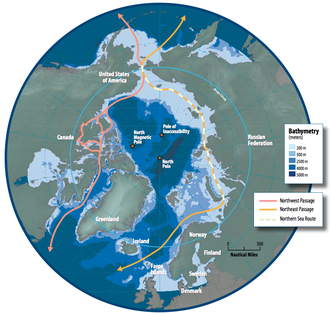Arctic Ocean





Arctic Ocean
The Arctic Ocean is the smallest and shallowest of the world's five major oceans. It is located in the Northern Hemisphere and mostly in the Arctic north polar region. The Arctic Ocean is surrounded by Eurasia and North America, and it is partly covered by sea ice throughout the year, reaching its maximum extent in March and its minimum in September.
Geography[edit]
The Arctic Ocean is bounded by the European Arctic, the Siberian Coast, the North American Arctic, and the Greenland Sea. It connects with the Pacific Ocean through the Bering Strait and with the Atlantic Ocean through several passages, including the Fram Strait, the Denmark Strait, and the Norwegian Sea. The ocean's major islands include Ellesmere Island, Svalbard, Franz Josef Land, and Novaya Zemlya.
Climate[edit]
The climate of the Arctic Ocean is characterized by long, cold winters and short, cool summers. The presence of sea ice has a significant impact on the climate, as it reflects sunlight and insulates the relatively warm ocean water. However, the extent of sea ice is decreasing due to global warming, which has implications for global climate patterns.
Ecology[edit]
The Arctic Ocean has a unique and fragile ecosystem. Its marine life includes polar bears, seals, walruses, and various species of whales and fish. The ocean is also home to many types of phytoplankton and zooplankton, which are crucial to the food chain. The changing climate and melting sea ice threaten the Arctic ecosystem, impacting the habitats of many species.
Economic and Human Activity[edit]
Human activity in the Arctic Ocean includes fishing, shipping, and oil and gas exploration. However, these activities are challenging due to the harsh climate, ice cover, and environmental regulations designed to protect the Arctic's fragile environment. Indigenous peoples have inhabited the Arctic region for thousands of years, and their cultures and livelihoods are closely tied to the Arctic environment.
Environmental Concerns[edit]
The Arctic Ocean is facing several environmental threats, including climate change, ocean acidification, and pollution. The reduction in sea ice due to global warming is the most visible sign of environmental change in the Arctic. This has potential consequences for global weather patterns, sea levels, and the habitats of marine and terrestrial wildlife.
Exploration and Research[edit]
The Arctic Ocean has been a focus of exploration for centuries, from early voyages seeking the Northwest Passage to modern scientific research on climate change. Research stations and icebreakers allow scientists to study the ocean's physical, chemical, and biological properties. Understanding the Arctic Ocean is crucial for predicting future climate change and its global impacts.
Ad. Transform your life with W8MD's Budget GLP-1 injections from $75


W8MD offers a medical weight loss program to lose weight in Philadelphia. Our physician-supervised medical weight loss provides:
- Weight loss injections in NYC (generic and brand names):
- Zepbound / Mounjaro, Wegovy / Ozempic, Saxenda
- Most insurances accepted or discounted self-pay rates. We will obtain insurance prior authorizations if needed.
- Generic GLP1 weight loss injections from $75 for the starting dose.
- Also offer prescription weight loss medications including Phentermine, Qsymia, Diethylpropion, Contrave etc.
NYC weight loss doctor appointmentsNYC weight loss doctor appointments
Start your NYC weight loss journey today at our NYC medical weight loss and Philadelphia medical weight loss clinics.
- Call 718-946-5500 to lose weight in NYC or for medical weight loss in Philadelphia 215-676-2334.
- Tags:NYC medical weight loss, Philadelphia lose weight Zepbound NYC, Budget GLP1 weight loss injections, Wegovy Philadelphia, Wegovy NYC, Philadelphia medical weight loss, Brookly weight loss and Wegovy NYC
|
WikiMD's Wellness Encyclopedia |
| Let Food Be Thy Medicine Medicine Thy Food - Hippocrates |
Medical Disclaimer: WikiMD is not a substitute for professional medical advice. The information on WikiMD is provided as an information resource only, may be incorrect, outdated or misleading, and is not to be used or relied on for any diagnostic or treatment purposes. Please consult your health care provider before making any healthcare decisions or for guidance about a specific medical condition. WikiMD expressly disclaims responsibility, and shall have no liability, for any damages, loss, injury, or liability whatsoever suffered as a result of your reliance on the information contained in this site. By visiting this site you agree to the foregoing terms and conditions, which may from time to time be changed or supplemented by WikiMD. If you do not agree to the foregoing terms and conditions, you should not enter or use this site. See full disclaimer.
Credits:Most images are courtesy of Wikimedia commons, and templates, categories Wikipedia, licensed under CC BY SA or similar.
Translate this page: - East Asian
中文,
日本,
한국어,
South Asian
हिन्दी,
தமிழ்,
తెలుగు,
Urdu,
ಕನ್ನಡ,
Southeast Asian
Indonesian,
Vietnamese,
Thai,
မြန်မာဘာသာ,
বাংলা
European
español,
Deutsch,
français,
Greek,
português do Brasil,
polski,
română,
русский,
Nederlands,
norsk,
svenska,
suomi,
Italian
Middle Eastern & African
عربى,
Turkish,
Persian,
Hebrew,
Afrikaans,
isiZulu,
Kiswahili,
Other
Bulgarian,
Hungarian,
Czech,
Swedish,
മലയാളം,
मराठी,
ਪੰਜਾਬੀ,
ગુજરાતી,
Portuguese,
Ukrainian